INTERVIEW: FIRE & DUST MEETS BRENDA READ-BROWN
‘How to make an angel smile’
(written on a Greek island beach)
If there were angels,
then this is where they would live,
or somewhere like this;
not frozen in a gloomy church,
stuffed full of sin;
not weeping in a graveyard,
waiting for the end to begin;
not standing at the metal rail
of some poor patient’s bed,
grinning a welcome,
as the charts go down, and down.
No. Here, you see them sometimes,
in a wisp of spray,
a stretching dog,
an ancient turtle;
hear them in cicadas or goat bells
or the wind.
They glint in quartz,
sparkle on sand,
and relax each time a woman,
middle-aged and lumpy,
makes the brave decision
to be the first one there, that day,
to go topless on the beach.
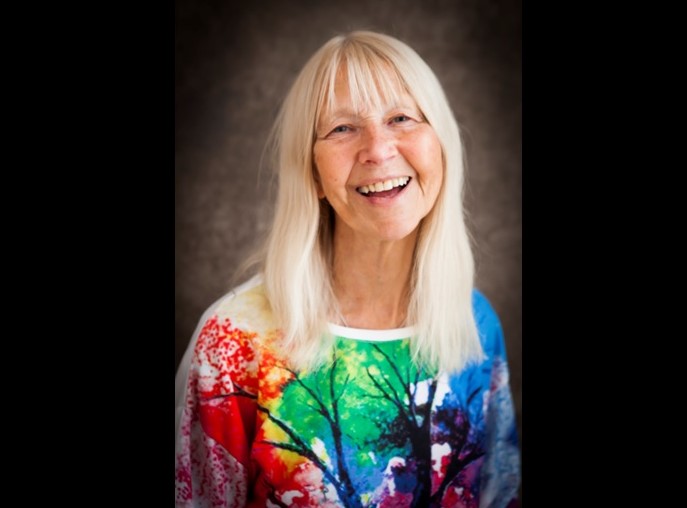
In 2001, Brenda Read-Brown gave up a secure career as a project manager to be a poet…which seemed a good idea at the time, and has since proven to be a very rewarding decision. Brenda has won many poetry slams and performed her poetry on BBC Radio 4, as well as in Texas, Denmark, the House of Lords, various festivals, and various other events and venues. She was Gloucestershire Poet Laureate from 2012-2019, and was also co-cordinator of Poetry On Loan (an organisation that promotes contemporary poetry through public libraries in the West Midlands) for fourteen years. She has published two collections of her poems: ‘Arbitrary edges’ (2013), and ‘Like love’ (V. Press, 2018). Currently, Brenda is touring with her show ‘But I haven’t finished yet!’ She’s also a prize-winning playwright, but gets her greatest rewards by helping other people find their words. Brenda is currently based in Worcestershire.
Brenda was our Fire&Dust headliner at Café Morso on 6th July 2023, where her lively poetry set was well-received by the crowd. We caught up with her after the gig, to ask a few questions…
HCE: Tell us a little about your background and journey as a writer so far. What inspired you to start creating and performing poetry?
BRB: I wrote quite a lot when I was a child; in fact, one of my poems was in a magazine that included the best work from kids in the Greater London Area, when I was about 8! Sadly, or probably fortunately, this hasn’t been preserved, because, as my mother said, “It was only a poem.”
But what really got me engaged with poetry was reading Roger McGough when I was 13 or 14; at last, here was poetry which had humour and a point and belonged to my world. ‘At lunchtime’ started me off… but then I hardly wrote anything until 1997. I wrote a few poems, and then thought one wasn’t too bad and showed it to some friends who were very encouraging. I didn’t know what to do with it, though, until I saw the Cheltenham Literature Festival Allcomers’ Slam advertised, and I entered. I didn’t win, obviously, but I didn’t do too badly, and again had encouragement from some key people – and I haven’t stopped since.
HCE: Do you find your experience as a project manager has a helpful influence on your self-discipline and organisation skills as a writer?
BRB: Not so much as a writer, but certainly in organising my work. Often people are looking for a poet who can plan a project, deliver it, write evaluation reports, manage the finances, etc., and I’m very lucky in that these things come as second nature to me.
I also used to write manuals, and that has been useful – instruction manuals have to be precise, and I like to think that that respect for precision has carried over into my creative writing.
Also, my invoices also go in very promptly, and I do my income tax return in August. My father was an accountant!
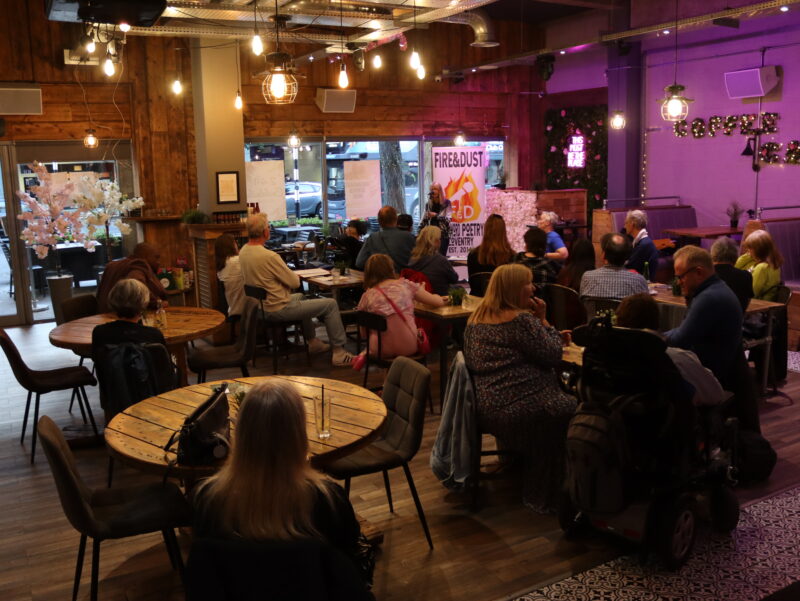
HCE: Who is your work aimed at – do you have an ideal audience in mind when you’re putting a poem together?
BRB: That’s an interesting one. When I start writing a poem, I usually know very quickly if it’s going to be a performance piece, and if it is, then the feelings of the audience are in my mind while I’m writing. Do I want to make them laugh? cry? get angry? all of the above? And of course there are tricks and tools that help with what is really, I suppose, manipulation. And as for an ideal audience – I wish such a thing existed! All audiences are different, and I’ve learned that you can never make assumptions about them.
But if a piece is not going to be primarily for performance, then I write for myself.
HCE: Your most recent published poetry collection is Like love. What sort of themes can readers expect to encounter in this book, and what messages(s) do you hope they take away from it?
BRB: A friend of mine wrote “you’ve managed to write a collection of poems around love which is real and authentic and sees its beauty and its sometimes awfulness (my word) in many different guises”. That’s what I was aiming for, really.
HCE: It’s a pretty amazing feat to have won thirty-five or more slams! Any top tips for open mic-ers planning to venture into the slam poetry scene? What are some essential ways to prepare for a slam?
BRB: Oh, I could go on for ages! But here are a few:
- Know your poem really well. If you feel you have to have the book or paper in front of you, OK, but look at the audience and engage with them as often as you can, and certainly at the beginning and the end.
- Believe in what you’re saying.
- Remember that the audience is on your side; they want you to do well.
- Watch and listen to other slam poets. What works well, and what doesn’t work so well? Don’t try to change your personal style because if you do you will lack authenticity, but you can adopt some ideas and discard other things while still keeping true to yourself.
- Don’t worry about being nervous! I’m still so nervous before a gig that I can’t eat, but when it’s my turn to go on stage I give myself a little shake and become The Poet, rather than just myself.
- Don’t rush! Give yourself a moment at the mic before you start, and look at the audience, with a facial expression appropriate to your poem; this helps both you and the audience to get into the right frame of mind.
- Listen to advice from other people, and if it feels right, make changes. If it doesn’t feel right, stick to what you want – but always listen to constructive feedback.
- Keep trying. It was ages before I won a slam; I thought I was destined to come second for ever.
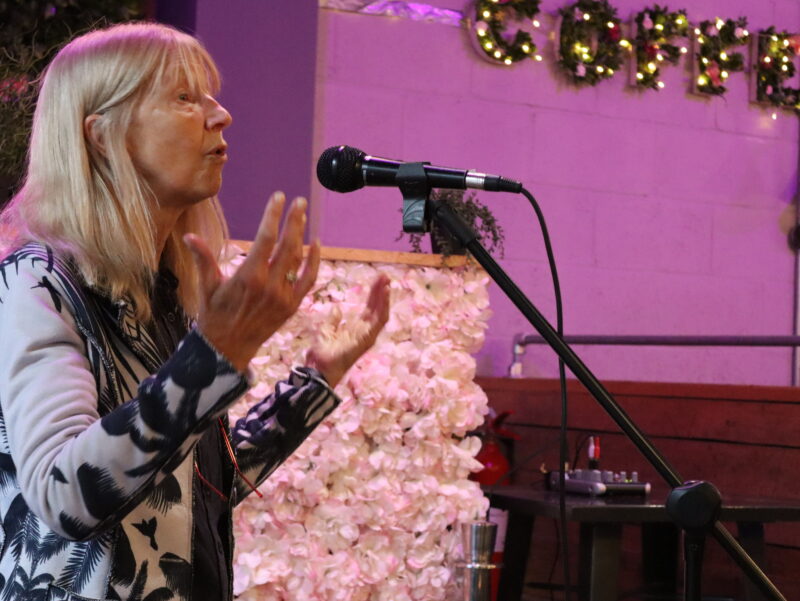
HCE: You held the role of Gloucestershire Poet Laureate for about seven years. Can you share a few highlights from the experience, and what sort of impact the laureateship has had on your practice as a writer?
BRB: Hmm. I’m afraid it wasn’t that great. The organisation that set up the idea of the Gloucestershire Poet Laureate disappeared soon after I started, and I had very few contacts and starting places. I should have made more of it, as my successor certainly has, but the poetry scene was much less lively then than it is now, and it was difficult to get anything going without any support.
I did enjoy performing a few poems for the Cheltenham mayor-making, and also going round the county writing poems about lots of different places; some of these poems were displayed in my local library.
The biggest impact was that I was asked to write a history of Tewkesbury, in poems, songs and prose, for a major new work commissioned by Tewkesbury Town Band that involved the band, five choirs, the Town Crier, the battle re-enacters… They asked me because I was Laureate, and it was a fantastic experience, although sadly it was performed only once.
HCE: Do you tend to segregate your work into ‘written for the page’ and ‘written for the stage’? For instance, was it an easy or difficult task deciding which poems you should publish and which to include in your show ‘But I Haven’t Finished Yet!’?
BRB: Choosing poems to go in my books was incredibly difficult, and I think I probably got it wrong. I should have put together another new book by now, but I find it really hard to decide which poems should go in.
Choosing poems for the show was a bit easier. I knew what my theme was going to be, so that narrowed the field considerably. I had a longlist (much too long), and then I had to consider each one and ask whether it really held its place, or if it was just repeating what I had said in other poems. I had the help of an outside eye (Jonny Fluffypunk) in making the shortlist, and invaluable assistance from the Inn Crowd people in determining the final structure of the show.
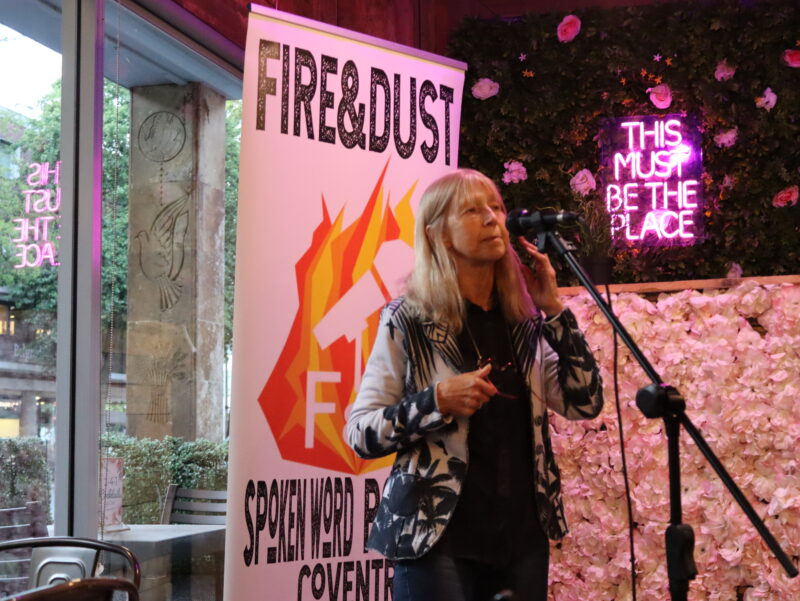
HCE: Some of your poems at Fire&Dust touched on the topic of age. Do you think literary scenes and communities are doing a good job of spotlighting and celebrating older poets, in particular older women poets – and if not, what are some approaches to it they could take to improve this?
BRB: I don’t really feel qualified to answer this. Certainly recently I have seen shows advertised that focus on older women poets, and that never happened in the past, so things are definitely changing. But personally, I am not keen on the idea of spotlighting any particular group of poets – we are all individuals, and it’s our poetry that matters, not ourselves.
HCE: Your headline set featured a good dose of overtly funny poems and poems with enjoyable touches of comedy and wit. How important a writing device is humour for you, and what purposes do you feel it serves in poetry and performance?
BRB: I’ve been to poetry evenings with no humour at all, and they have been dire experiences that I would not want to repeat. Who wants misery for a whole evening? I like to start a set with some funny poems and finish with poems that make people feel good; in between I usually do more serious or emotional poems. But I don’t want to leave people crying!
Also, anyone can write serious poems. Writing funny poems is much, much harder. It’s a challenge, and I like being challenged. Often in workshops I encourage people to write funny poems, and they are always delighted when they manage to make people laugh.
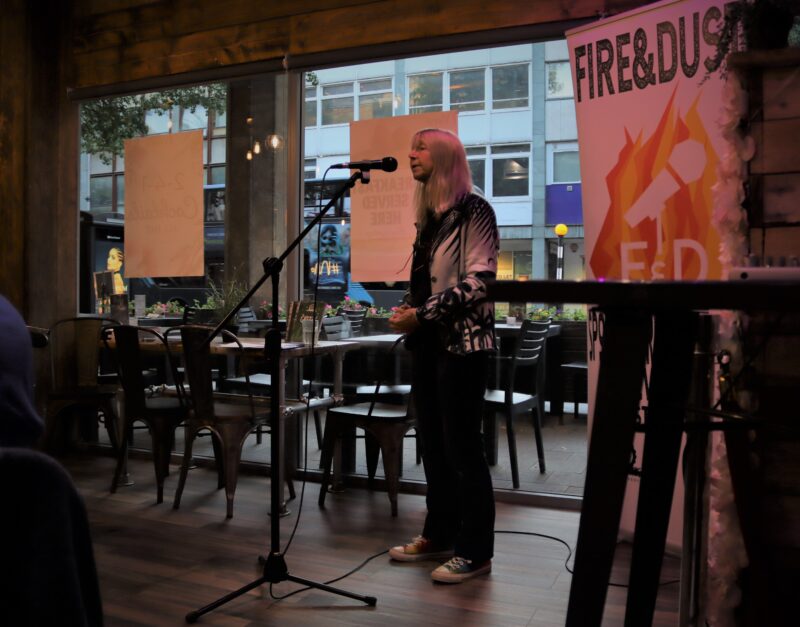
HCE: What is it about the one-act play that attracts you as a writer? Is there a lot of humour in your scripts too, or is that where your darker side expresses itself?
BRB: My writing has always been condensed; I think that it might because I like to get things done quickly. Some ideas can’t easily fit into a poem, though, and writing short-form plays seemed a natural extension of writing poems for me.
My plays are as varied as my poems. Some are intended to be funny, and sometimes a bit whimsical (for example, Rocks off, which features two penguins); others are deadly serious, such as my recent play Victim, which looked at an accusation of rape. I think the best thing I’ve ever written was a one-act play called Once this was a poet, which is an autobiographical study of my year with my late husband Pete Brown, who died in 2000. I’m hoping to revive this next March. This has a lot of humour, but inevitably sadness too.
HCE: What, in your opinion, do most well-written poems have in common?
BRB: A truth. Something that makes me aware of a truth that I hadn’t fully considered. And the craftmanship to ensure that this truth is expressed clearly, while leaving enough space for the reader or listener to bring their own experiences, feelings and knowledge to bear.
I can’t stand pretentious poetry, or poetry that is written deliberately to be obscure.
HCE: Who or what would you say are the biggest influences on your own poetry?
BRB: I’ve already mentioned Roger McGough, without whose influence I wouldn’t be a poet. My favourite poet now is Billy Collins, whose apparently effortless conversational style masks terrific craftmanship, and I wish I could write with Neruda’s simple beauty. Matt Harvey’s often whimsical approach allows difficult things to slip through, and Jonny Fluffypunk has a deftness of touch that I admire greatly – read his poem Towels. Not many people nowadays have heard of Rob Evans, but he is a brilliant poet who was a big influence on me early on, with a style of delivery quite different from most slam poets. But there are so many that I could mention!
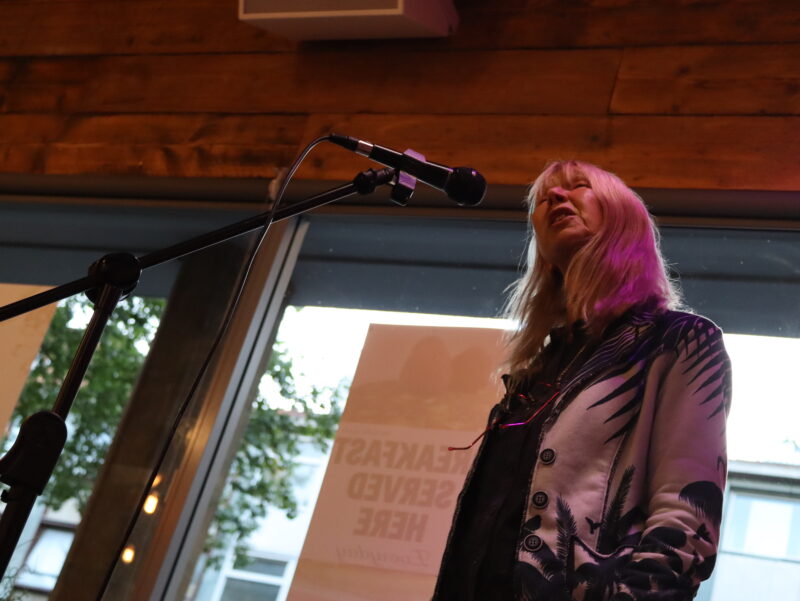
HCE: What’s next on the horizon for you, after touring the show? Are you working on a new book or play?
BRB: As I mentioned, I hope to revive Once this was a poet. I’m also working on a new one-act comedy, and when I finally get some time, I’ll be putting together a new poetry collection, which will be called Our only chance.
HCE: What’s the best way for people to keep connected with you and your work, or contact you for bookings?
My website is the best place! I’m on Facebook too, under my own name – Brenda Read-Brown. I’m not very good at promoting myself, but I do sometimes put up details of gigs, etc.
HCE: Is there anything we didn’t cover that you’d like to share with our readers?
BRB: Just that appearing at Fire and Dust was an absolute joy. It’s amazing that you keep this terrific poetry evening going, and I hope that you continue to do so for a very long time! Thank you so much for having me.
Brenda’s poetry collection Like love is available online direct from publisher V. Press or direct from Brenda herself, as well as other bookshops and retailers.
